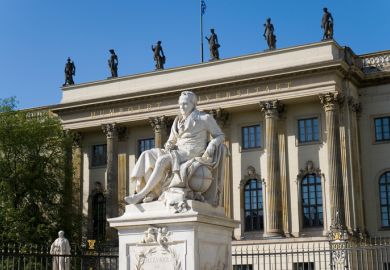Academics have no "right" to research terrorist materials and they risk being prosecuted for doing so, the vice-chancellor of the University of Nottingham has told his staff.
In a statement issued to the university last week, Sir Colin Campbell says: "There is no 'right' to access and research terrorist materials. Those who do so run the risk of being investigated and prosecuted on terrorism charges. Equally, there is no 'prohibition' on accessing terrorist materials for the purpose of research. Those who do so are likely to be able to offer a defence to charges (although they may be held in custody for some time while the matter is investigated). This is the law and applies to all universities."
Sir Colin issued the statement to advise staff to note "additional points" that have emerged since the arrest in May of a Nottingham masters student and a clerk on suspicion of possessing extremist material.
The student, Rizwaan Sabir, who is studying Islamic terrorism, said he had downloaded a copy of an al-Qaeda training manual for use in his MA dissertation and PhD application and had forwarded it to the administrator, Hicham Yezza, for printing. After six days in detention, neither was charged.
Sir Colin referred to a letter of advice issued to Mr Sabir by the police after his release.
The letter warned Mr Sabir that he risked re-arrest if found with the manual again and added: "The university authorities have now made clear that possession of this material is not required for the purpose of your course of study nor do they consider it legitimate for you to possess it for research purposes."
Sir Colin says in his statement: "It is understood that the police drafted this letter having considered all of the statements made by a range of university staff and they also consulted their legal advisers on it."
He adds: "We have been advised that the document in question was one which others have been arrested and prosecuted for possessing. Different versions of the 'al-Qaeda Training Manual' exist but in this case the document was an operational or tactical manual rather than a political or strategic document. The police are clear that such a document, which included detailed instructions, is therefore likely to be useful to someone preparing an act of terrorism."
Mr Sabir's personal tutor Bettina Renz, a lecturer in international security, and his MA supervisor, Rod Thornton, a terrorism specialist and former soldier, have both said they told police that Mr Sabir's possession of the document was legitimate given his research interests.
Since his release without charge, Mr Sabir has been accepted to study for a PhD in radical Islam at Nottingham under Dr Thornton's supervision. His doctorate application proposes an analysis of Islamic terrorists' military and political strategy "based on primary documents, including reports published by think-tanks and research centres and documentation published or released by Islamist groups (strategic and political statements, military manuals, group manifestos and charters)".
Mr Sabir insisted to Times Higher Education that he had downloaded his version of the al-Qaeda manual from a US government website and that it was still freely available on the internet.
He said he was now unclear what he could and could not legitimately research for his PhD, given the police and the university's warning.
Vanessa Pupavac, lecturer in international relations at Nottingham, said: "The university suggests it is illegitimate to study the operational or the tactical as opposed to the political or strategic dimension of al-Qaeda." Scholars were interested in both dimensions, she argued. "A major theme of security studies is how the parties in the so-called war on terror lack clear political and strategic goals. Contemporary terrorism emphasises the operational and tactical over the political. Consider the 9/11 or 7/7 or the Beslan terrorists - their violent tactics were starkly evident, but their political and strategic goals were vague."
Nottingham's MA in international security and terrorism includes a module on terrorism and counterterrorism. Essay titles for this academic year include: "Choose one terrorist group and analyse its motivations, techniques, tactics and procedures" and "How is today's terrorism conducted?"
Sir Colin's statement says the university's response to the arrests and their aftermath "have been discussed at meetings of senate and council. Both bodies have fully endorsed the actions taken by the university."
Hicham Yezza, the clerk arrested with Rizwaan Sabir, was re-arrested on immigration-related grounds after his release and was due to be deported until proceedings were stayed pending judicial review.
melanie.newman@tsleducation.com
To stay out of jail, don't download
Oliver Blunt QC, of the Anti-Terrorism team at Furnival Chambers in London, said that academics do have a "right" to "access" terrorist materials, whether for research or otherwise, as long as they do not "possess" them.
He said: "Once the researcher knowingly downloads or saves the materials that he is accessing, then he is in 'possession' of terrorist materials.
"There is no 'right' to 'possess' terrorist materials and, while a genuine researcher would be able to establish a defence, the evidential burden is on the researcher to do so."
Register to continue
Why register?
- Registration is free and only takes a moment
- Once registered, you can read 3 articles a month
- Sign up for our newsletter
Subscribe
Or subscribe for unlimited access to:
- Unlimited access to news, views, insights & reviews
- Digital editions
- Digital access to THE’s university and college rankings analysis
Already registered or a current subscriber?



